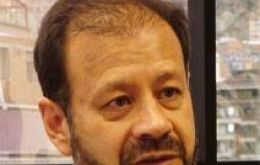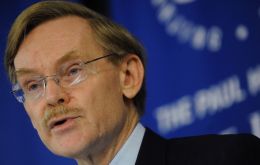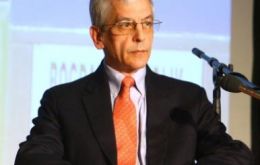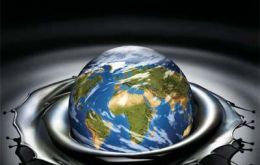MercoPress. South Atlantic News Agency
Stories for April 2011
-
Thursday, April 14th 2011 - 22:57 UTC
Latam’s challenge: combating inflation but also the inflow of speculative capital

Strong public and private consumption, abundant credit and strong currency appreciation among other reasons helped Latin American countries overcome the 2008/09 recession and outperform other regions according to the World Bank report Latin America and the Caribbean’s Success Put to the Test.
-
Thursday, April 14th 2011 - 21:01 UTC
More people deeper in poverty as food prices soar 36%, says World Bank

Driven in part by higher fuel costs connected to events in the Middle East and North Africa, global food prices are 36% above their levels a year ago and remain volatile, pushing people deeper into poverty, according to new World Bank Group numbers released Thursday.
-
Thursday, April 14th 2011 - 20:43 UTC
The bank that grasses politicians up

A banker is a fellow who lends you his umbrella when the sun is shining and wants it back the minute it begins to rain” claimed Mark Twain a long time ago. After greedy and socially irresponsible bankers wreaked havoc around the world in 2008 no wonder this cynical comment by the famous writer is still referred to.
-
Thursday, April 14th 2011 - 19:54 UTC
BRICS calls for new global monetary system with less reliance on the dollar

The BRICS group of emerging-market powers kept up the pressure for a revamped global monetary system that relies less on the US dollar and for a louder voice in international financial institutions.
-
Thursday, April 14th 2011 - 19:47 UTC
Argentine soy-oil industry diversifies markets following China’s ban

China is far from normalizing soy-oil purchases in Argentina since it has not placed new orders according to the Argentina Cooking Oil Industry Chamber, CIARA. However the industry has managed to diversify markets.
-
Thursday, April 14th 2011 - 19:43 UTC
Venezuela and Argentina have the highest inflation rates in South America

Venezuela and Argentina recorded the highest rates of inflation in South America during the first quarter of 2011 according to the latest data available.
-
Thursday, April 14th 2011 - 16:55 UTC
New Paraguay minister to press for vote on Venezuela’s Mercosur incorporation

Venezuela in Mercosur will act as a balancing element and Unasur has more than proven its merits, said Paraguay’s new Foreign Affairs minister Jorge Lara Castro who insisted the country must work urgently to overcome asymmetries in the region and passive integration is not enough.
-
Thursday, April 14th 2011 - 16:50 UTC
Doctors tell Argentine president to cancels Mexico trip and rest another 24 hours

Argentine President Cristina Fernández de Kirchner cancelled her trip to Mexico City and rescheduled it for May 30 after being told by Presidential Medical Unit doctors to rest for a further 24 hours, despite showing a 'satisfactory improvement' from the turn of low blood pressure she suffered Tuesday.
-
Thursday, April 14th 2011 - 05:34 UTC
Oil to remain high, look for alternative sources of energy recommends IMF

Oil prices are likely to remain high for the foreseeable future and IMF economists say that governments should be looking to back sustainable alternative sources of energy.
-
Thursday, April 14th 2011 - 05:32 UTC
UN peacekeeping operations to suffer most from US funding cuts

United States lawmakers are poised to cut spending on the United Nations by hundreds of millions of dollars, less than a week after UN Secretary-General Ban Ki-moon came to Congress to ask for continued strong support.
